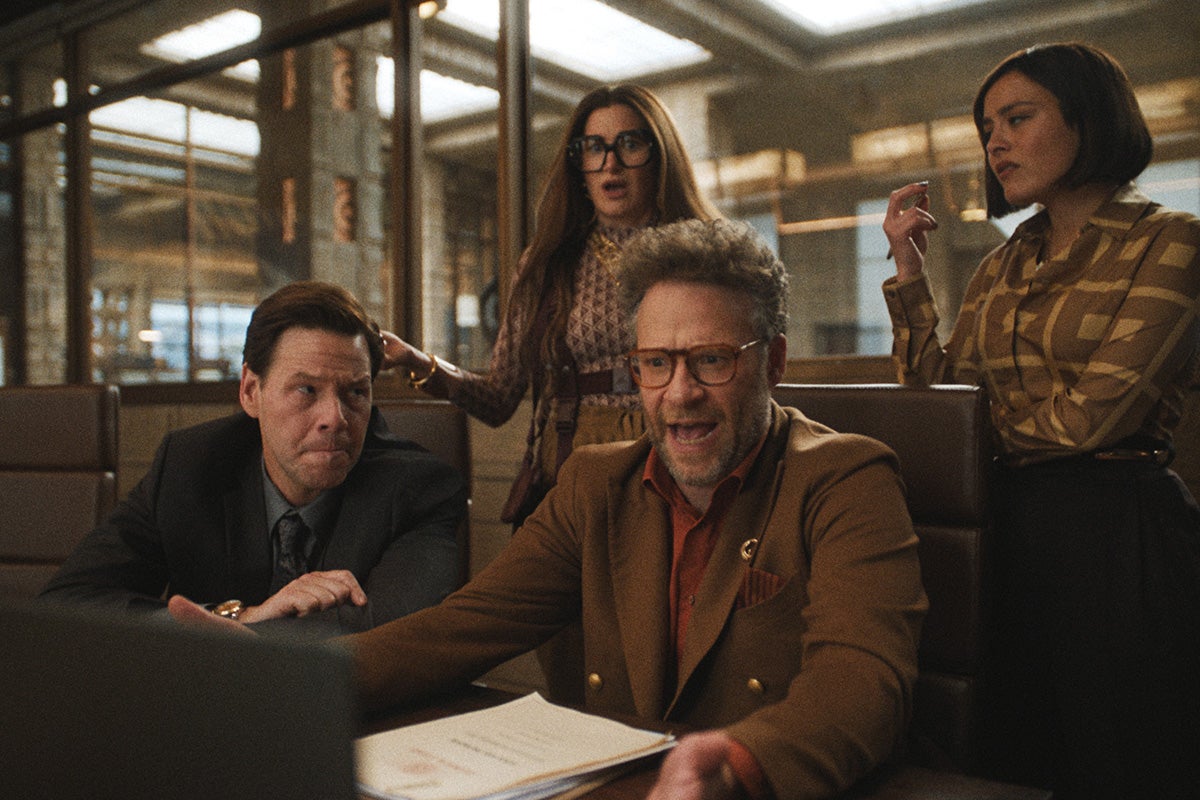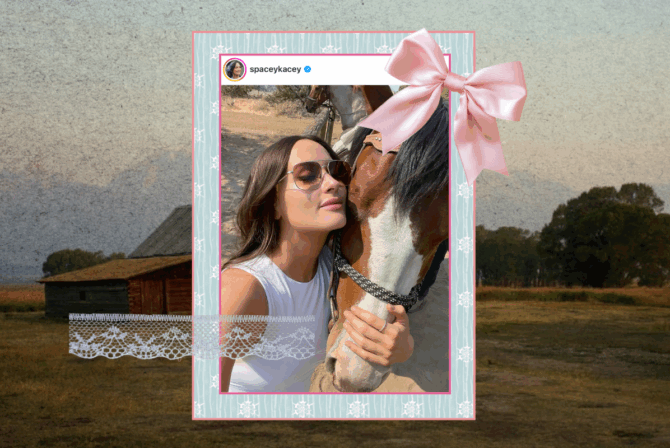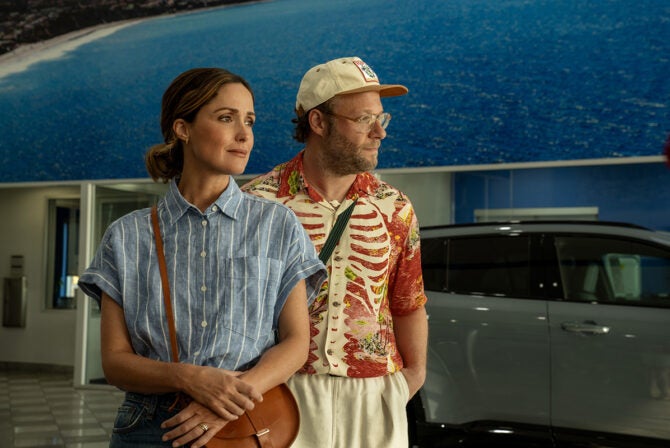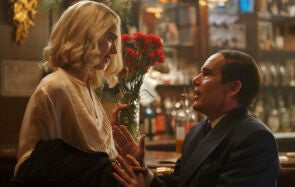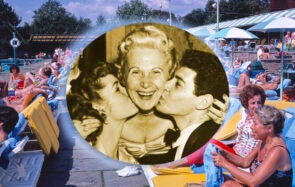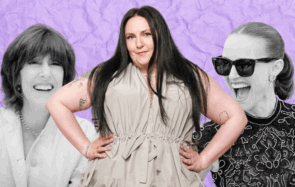In the seventh episode of “The Studio,” “Casting,” Seth Rogen’s Matt Remick, the new head of the fictional Continental Studios, along with his team, try to cast their new “Kool-Aid” franchise movie in an inclusive way.
It is, like the rest of this excellently addictive series, a moment in which Rogen pokes fun at the industry that he is a part of by putting a mirror up to its ridiculousness. They need “0.36 of an Asian person,” Continental creative executive Sal Saperstein, played by Ike Barinholtz, says.
Remick replies: “Israel is technically a part of Asia.”
Kathryn Hahn’s Maya Mason, the movie studio’s head of marketing, groans at what she knows Remick is going to say: “We’re not going there,” she warns him.
But Remick is undeterred. “Going where? Jews are a race. It’s not my fault Jews are a race! It’s not here or there. We are a race of people and a religion. It’s complicated. Do we need Jewish representation in the film? Should we cast Josh Gad?” Remick responds almost breathlessly, before his hilarious tangent is dismissed (I mean, Josh Gad is also my favorite token Jew!). A big franchise movie doesn’t need a Jewish person. In that little funny moment, “The Studio” doesn’t only aptly get at the head-spinning complexity of being a Jewish person, but it also seems to scoff at anyone who believes Jews run Hollywood. I mean, they can’t even get one single Josh Gad into a movie that’s essentially about a sugary red drink. The Jewish execs of “The Studio”? They’re not malicious or craven, they’re more bumbling men with good intention, torn between wanting to create beautiful films and to help their studios make money (and therefore, fund more of those movies they love). They’re more nebbish than machers. And they’re an utter delight to watch in what is clearly a love letter to cinema.
Unlike the fictional “Kool-Aid” movie, the cast and team behind “The Studio” features quite a few Jewish creatives — there’s Rogen, of course, and his frequent collaborator and bar mitzvah Hebrew school friend Evan Goldberg who helm the show as co-creators, writers and executive producers. Then there’s Rogen’s Remick and Barinholtz’s Saperstein, whose Jewishness gets pointed out in the first episode by fellow real-life Jew David Krumholtz’s fictional Jew Mitch Weitz. Rhea Perlman plays Matt’s fairly stereotypical (but somehow still adorable) Jewish mom. Then there’s a bunch of Jewish actors and directors who play themselves: Dave Franco, Nick Stoller, Aaron Sorkin, Zac Efron and Zoe Kravitz to name but a few.
There is one big Jewish joke that threads throughout the show courtesy of Krumholtz’s Weitz, who in a business dinner with Nick and Remick says, “They say there are no more Jews working in Hollywood, look at us! We’re almost to a minyan!” he tells them enthusiastically (they are exactly seven people short of one, to be fair). “You guys need some Manischewitz, shake a fucking lulav,” he continues, and Remick replies with an uncomfortable, “Yeah, we’re all Jewish, it’s very very funny.”
Weitz’s Jewish jokes are genuinely funny. They’re deep cuts for Jewish watchers and also extra hilarious for us because they feature a lot of mispronunciation and misuses of Jewish words and concepts — Weitz’s shtick is mostly harmless and skin deep even if it makes Remick deeply uncomfortable. But when he crosses the line and asks Remick, “Why you gotta Jew me like this,” the executive bristles. “I know we’re both Jewish,” he says. “I don’t love the Jew jokes.” It’s another way the show takes on the “Jews run Hollywood” trope: showing Remick’s discomfort at having his identity constantly pointed out, even though in moments like that one in episode seven, it erupts out of him.
And Rogen himself is very aware that Jews made it into Hollywood because of oppression: “It’s an industry largely founded by Jewish people; I think almost all the original heads of all the major studios were Jewish people because Jews were not allowed to work in other industries and movies were really looked down upon and viewed as a kind of garbage industry that was kind of fit for Jews, and we did great with it, so, you know – thank god,” he told the Jewish Chronicle. There are many Jewish actors who go through their careers rarely, if ever, acknowledging that aspect of their identity, but Rogen isn’t one of them. Along with Goldberg, he is a creator who often leans into and incorporates his Jewish identity into his craft and this show is just one of many examples of that.
“The Studio” also folds into itself another type of oft used Jewish joke trope, that of the stereotypical Jewish mom. When we first meet Rhea Perlman’s character, she is a kvetchy voice over the phone, asking her son to thank her if he wins a Golden Globe. When he explains that he, as an executive, can’t be nominated for one, but one of his movies directed by Zoe Kravitz is, she complains “the Leventhals drove from Syosset to watch with me,” and urges him to “just run up on stage with the rest of them, give your mother a little wave.” She dotes on her son, worries about his work and his relationships, encourages him in his work and also calls him fat. Aside from the Jewish last names there’s not really a mention of Judaism but Perlman’s character is very clearly Jewish mom coded, annoying in certain instances and in others, delightful.
Perhaps the movie’s most enjoyable small Jewish moments comes from Kravitz herself, who in a wonderfully unhinged scene from the finale in which Remick and his team are about to take the stage in CinemaCon, yells: “You can do it, you’re a black Jewish queen, you’re Zoe Kravitz!” It’s a little spark of Jewish joy in one of the most enjoyable and out-there TV episodes I’ve ever seen.
“The Studio” shows us what being Jewish in Hollywood really is, and it’s something that I notice a lot when I interview actors and directors (feeling at times painfully a little like Weitz, throwing names of Jewish holidays and foods at them): Many Jews in Hollywood feel at once a pride or a love for aspects of that identity, but also a profound discomfort with having it under a singular spotlight. The Jewish creatives who founded the movie industry were all deeply informed by their experience as Jews, but found in making movies a way to succeed, to assimilate into, America, to not be so other. And yet, as often happens when Jewish people succeed, it gets co-opted into new ways to be antisemitic, and Jewish people in the movie industry can’t help but live with that awareness. Yet in this show, Rogen plays a fairly elegant dance with it.
“The Studio” is an ode to the dedication and the love of the craft that so many in the admittedly very flawed movie industry have, a love that dates back to the industry’s many Jewish founders. Yes, “The Studio” is hilarious, but it also holds in it a reverence and passion for movies, one that you can see in so many of its brilliant visual and TV-making choices, that echo films we love.
And through it strums — softly in the background, not at the center but not ignored — that relationship with Jewish identity, in its humor and laughter and discomfort, and yes, sometimes in defiant pride. Rogen and Goldberg prove to us that they are (Jewish?!) visual storytelling royalty, and I’m so grateful we’ll get a second season of this excellent show.
